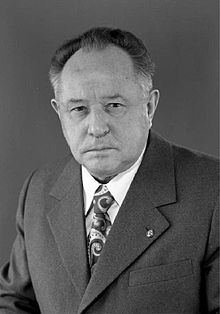Erich Mielke
| Erich Mielke | |
|---|---|
 |
|
|
Minister of State Security of the German Democratic Republic |
|
|
In office 11 December 1957 – 18 November 1989 |
|
| President |
Wilhelm Pieck (1957–1960) Walter Ulbricht (1960–1973) Friedrich Ebert (1973) Willi Stoph (1973–1976) Erich Honecker (1976–1989) |
| Prime Minister |
Otto Grotewohl (1957–1964) Willi Stoph (1964–1973) Horst Sindermann (1973–1976) Willi Stoph (1976–1989) Hans Modrow (1989) |
| Lieutenant |
Walter Ulbricht (1957–1971) Erich Honecker (1971–1989) |
| Preceded by | Ernst Wollweber |
| Succeeded by | Wolfgang Schwanitz |
| Personal details | |
| Born |
Erich Fritz Emil Mielke 28 December 1907 Berlin, Kingdom of Prussia, German Empire |
| Died | 21 May 2000 (aged 92) Berlin, Federal Republic of Germany |
| Political party | Socialist Unity Party of Germany |
| Spouse(s) | Gertrude |
| Children | Frank Ingrid |
| Occupation | Executioner, Government Minister, Armeegeneral, Chairman of SV Dynamo. |
| Erich Mielke | |
|---|---|
| Occupation | communist official and Stasi leader |
| Criminal penalty | 6 years imprisonment |
| Criminal status | Paroled in 1995 due to poor health |
| Conviction(s) | Double homicide, attempted murder |
Erich Fritz Emil Mielke (28 December 1907 – 21 May 2000) was a German communist official who served as head of the East German Ministry for State Security (Ministerium für Staatsicherheit), better known as the Stasi, from 1957 until shortly after the fall of the Berlin Wall in 1989.
A native of Berlin and a second-generation member of the Communist Party of Germany, Mielke was one of two triggermen in the 1931 murders of Berlin Police Captains Paul Anlauf and Franz Lenck. After learning that a witness had survived, Mielke escaped prosecution by fleeing to the Soviet Union, where he was recruited into the NKVD. He was one of the perpetrators of the Great Purge as well as the Stalinist decimation of the International Brigade during the Spanish Civil War.
Following the end of World War II, Mielke returned to the Soviet Zone of Occupied Germany, which he helped organize into a Marxist-Leninist dictatorship under the Socialist Unity Party (SED), later becoming head of the Stasi; according to John Koehler, he was "the longest serving secret police chief in the Soviet Bloc".
...
Wikipedia
